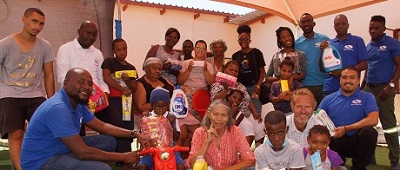
Otjozondjupa’s Ecosystem Adaptation Project illuminates gender equality progress

Otjiwarongo, nestled in the heart of the Otjozondjupa region, witnessed a powerful narrative of empowerment and societal transformation as the Ecosystem-Based Adaptation (EBA) project, a joint initiative by the Environmental Investment Fund (EIF) and the Ministry of Environment Forestry and Tourism (MEFT), successfully concluded a groundbreaking gender mainstreaming training.
Spanning from December 18 to 19, this event transcended the mere confines of a workshop. It stood as a beacon guiding the way toward a more inclusive, resilient, and egalitarian future.
At the forefront of change, Project Manager Mr. Bryan Gaomab extended a warm welcome to all participants, setting the stage for an open discourse on integrating gender considerations into project and community activities. This marked the initial stride toward crafting a collective narrative that surpassed routine discussions to delve deeper into profound issues.
Guiding this transformative journey was Ms. Kredula Shimwandi, a Gender Young Professional from EIF, who passionately outlined EIF’s commitment to gender equity. “Our gender policy seeks to scrutinize and address gender-related matters at every project phase – planning, execution, monitoring, and evaluation,” she emphasized, underlining gender’s pivotal role in sustainable development.
Ms. Shimwandi delved into the differentiated impact of climate change on genders, stemming from societal roles. The gendered division of labor, coupled with unequal decision-making power, presented distinct adaptation opportunities. She emphasized that involving women and men in climate action was not just a strategy but a fundamental necessity to confront the challenges of a changing climate.
“Teach your boys and girls how to carry out daily activities without discriminating based on gender roles,” she urged, stressing the imperative to nurture resilience and address climate change without bias. Her words reverberated not merely as guidance but as a call to instigate change at grassroots levels, within households and communities alike.
The EbA Project Management Unit underscored the pivotal importance of Gender-Sensitive Reporting. Participants engaged in discussions about reporting requisites integral to EBA project implementation. It wasn’t merely about data; it was about giving voice to the intricacies of gender dynamics woven into the project’s fabric.
As the echoes of the workshop resonated, Mr. Bryan Gaomab stepped forth to mark the conclusion, recognizing this not as the end of a training session but as a spotlight on entrenched gender gaps and barriers in the region. He outlined expectations for gender mainstreaming through the EBA project, urging beneficiaries to not just accept but champion gender mainstreaming.
“Be the voices of the voiceless when you return to your communities,’ he passionately implored, emphasizing this was not about establishing gender superiority or inferiority but a call to unite against climate change impacts, transcending barriers toward a sustainable and equitable future.
Every word spoken, every insight shared, and every commitment made in this transformative journey became a thread in the fabric of change, weaving a tale of resilience, inclusion, and collective responsibility. Otjozondjupa ceased to be merely a location on the map; it became a canvas where purpose and passion painted the brushstrokes of change.











































